|
 Secure Site
Secure Site
|
 |
Archive for the 'mindfulness practice' Category
 Your body has a message for you...yoshitoshi taiso Your body has a message for you. Are you listening?
Our bodies are innately wise and have much to teach us about restoring and preserving our health…if we are willing to listen. A symptom is more than an isolated event. It is a messenger from our body giving us a “heads up” that an underlying problem exists and needs attention. If we learn to pay attention and understand the message provided by these “teaching assistants” sent by our bodies, symptoms become opportunities for implementing changes.
Mind-Body Connection
Your body and mind are interconnected, and each impacts the other. When you hurt your foot, your body shares this information with your mind, and you feel pain. When you’re worried about something, there is a physical response in your body. When you’re excited and happy, your body has a different physiological response.
Some people get sweaty palms when they’re nervous. Some get a sharp pain in their shoulders and neck when they feel they carry “the weight of the world.” Some people get headaches when they haven’t eaten properly. Some breathe shallowly and quickly when they’re anxious about something. These are all examples of your body providing you with information that allows you to take appropriate action.
If your observer is alert and you notice the physical phenomena present in your body, you obtain valuable information that you can use to impact your health and wellness. A pain that you’re feeling may be the result of an external incident such as banging your shoulder or cutting your foot; however, if there was not such an event, a physical ailment or change in your body’s status could be caused by some internal condition. If you pay attention to your body and address early signs suggesting that something may be wrong, you may be able to prevent larger problems from developing. Addressing these larger, more serious problems may be more painful and costly, and may require more invasive interventions.
Our Zen Clock’s long-resonating Tibetan bell-like chime makes meditating a beautiful experience – its progressive chimes begin your day with grace. When the clock’s alarm is triggered, the acoustic chime bar is struck just once … 3-1/2 minutes later it strikes again … chime strikes become more frequent over 10 minutes … eventually striking every 5 seconds until shut off.
adapted from Natural Solutions Magazine by Marc Levin, 8/2011
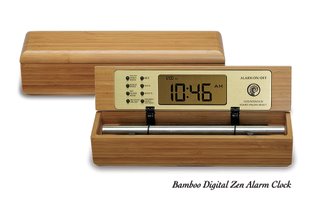 Zen Meditation Timers and Alarm Clocks with Chimes Now & Zen – The Zen Meditation Timer Store
1638 Pearl Street
Boulder, CO 80302
(800) 779-6383
Posted in Meditation Timers, Meditation Tools, mindfulness practice, Now & Zen Alarm Clocks, Well-being
 teahouse There was a monk who was a sincere and ascetic practitioner. He was scholarly and had great understanding. He lived in a monastery with eight hundred monks. The Buddha’s teachings went straight to his heart, engendering compassion, kindness, and humility. He never cared to sit on a high throne or be a leader of any kind. He always sat in the last row and took a small portion of what was left to eat. But one day, a patron came to the monastery with buckets of yogurt to offer the monks. The patron began serving yogurt to the monks in the first row, filling their large bowls. This monk enjoyed yogurt very much and grew concerned as he thought to himself, “He’s giving them so much yogurt, when he reaches my row, there may not be any left for me.” When the patron reached the last row, the monk could see that there was still plenty of yogurt in the bucket. The patron went to put a serving into the monk’s bowl, but this monk immediately turned his bowl upside down. The surprised patron asked, “What’s wrong?” The monk replied, “This greedy monk already had his yogurt when you were serving the front row. He doesn’t deserve any more.”
adapted from Natural Solutions Magazine by Shyalpa Tenzin Rinpoche, 3/2012
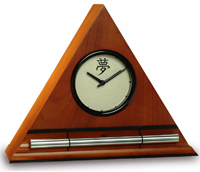 Zen Chime Alarm Clocks and Timers Now & Zen’s Chime Timer and Alarm Clock Store
1638 Pearl Street
Boulder, CO 80302
(800) 779-6383
Posted in Bamboo Chime Clocks, Meditation Tools, mindfulness practice, Now & Zen Alarm Clocks, Well-being
 Meditation Timers and Chime Alarm Clocks An accomplished meditator is capable of overcoming every obstacle in life. Developing this level of confidence requires an approach that goes beyond simply resting in a state of repose. It is not sufficient to learn a few techniques and practice meditation just to relax and quiet your mind. To sit calmly in your room, still your thoughts, and drift into a state of torpidity is not meditation. A cow may sit still and breathe quietly when its stomach is full, but can we call this meditation?Meditation is not just for relaxation; its primary purpose is to develop the capacity to respond skillfully and gracefully to life’s difficulties as well as its joys
Followers of the spiritual path must proceed in this way. Only then will we have the opportunity to experience the real essence and value of our human life. It is our chance to be reawakened, our precious opportunity to enjoy boundless energy and employ consummate skill for our own well-being and for the well-being of others.
The nature of the mind is unobstructed. Moment by moment, one thought is born, while another one dies. This energy is unceasing, and it springs from primordial wisdom. This energy is the essence of what we are. This essence manifests, but not in any solid or substantial way. We cannot imagine it or express it. It transcends imagination and expression.
adapted from Natural Solutions Magazine by Shyalpa Tenzin Rinpoche, 3/2012
Although meditation can be done in almost any context, practitioners usually employ a quiet, tranquil space, a meditation cushion or bench, and some kind of timing device to time the meditation session. Ideally, the more these accoutrements can be integrated the better. Thus, it is conducive to a satisfying meditation practice to have a timer or clock that is tranquil and beautiful. Using a kitchen timer or beeper watch is less than ideal. And it was with these considerations in mind that we designed our digital Zen Alarm Clock and practice timer. This unique “Zen Clock” features a long-resonating acoustic chime that brings the meditation session to a gradual close, preserving the environment of stillness while also acting as an effective time signal.
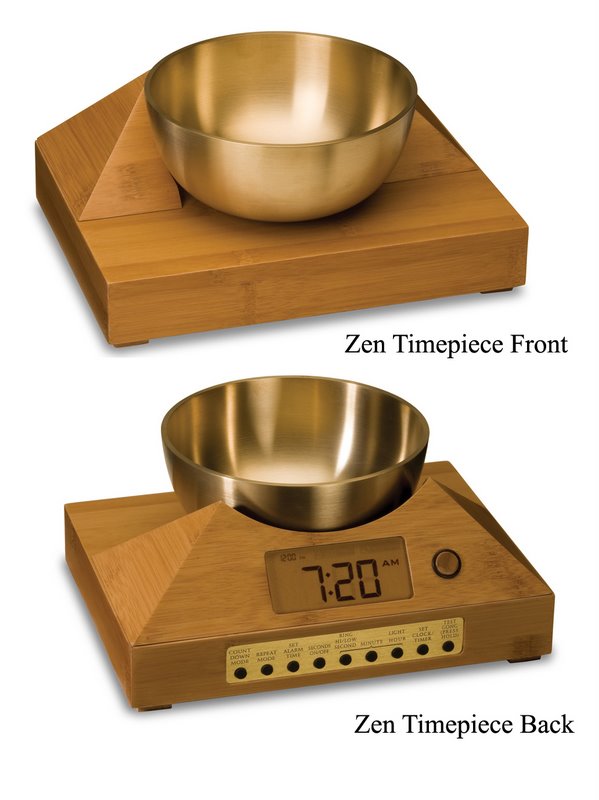 Singing Bowl Meditation Timers and Alarm Clocks Now & Zen’s Singing Bowl Timer Store
 Meditation Timer Shop In Boulder, Colorado 1638 Pearl Street
Boulder, CO 80302
(800) 779-6383
Posted in Bamboo Chime Clocks, Meditation Timers, Meditation Tools, mindfulness practice, Now & Zen Alarm Clocks, Zen Timepiece by Now & Zen, Zen Timers
 Japanese Ukiyoe Crane - Meditation Helps Us with More than Just Stress Meditation is not just for relaxation; its primary purpose is to develop the capacity to respond skillfully and gracefully to life’s difficulties as well as its joys. We have to reflect deeply on the uncertainty and brevity of our lifespan. Contemplate the fact that all the things in which we place our trust are contingent and constantly changing. We have to use our spiritual practice to look within and discover the heart of our being.
adapted from Natural Solutions Magazine by Shyalpa Tenzin Rinpoche, 3/2012
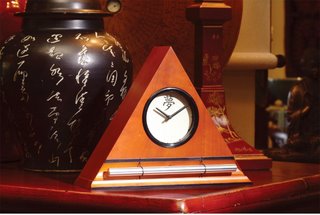 Meditation Timers and Soothing Chime Alarm Clocks Now & Zen – The Zen Chime Alarm Clock Store
1638 Pearl Street
Boulder, CO 80302
(800) 779-6383
Posted in Meditation Timers, Meditation Tools, mindfulness practice, Well-being
 Meditation It is a misconception that meditation is difficult
“Everyone says I should meditate. All spiritual books end with the advice to take time for meditation. But no one tells you how!” The young man who stood before me was completely stressed out. For months he had been trying to meditate but the more he tried, the more he failed. And now he was dumping his frustrations on me because I had just given a lecture on the importance of… meditation.
I got what he was saying. People often turn meditation into something really complex. For instance, some say when you meditate your expression should be very serious and holy as you try to curl the tip of your tongue back against the roof of your mouth while reciting an incomprehensible mantra in your mind. Or you should sit in such a way that you’re just about breaking your back, as well as your calves and knees, while rising above the pain by focusing on your breath. Or you should sit in front of a statue of an Indian god or goddess with an unpronounceable name and tune in so you can be transported to an unpronounceable place.
Is meditation really so complex? Do you really have to contort yourself to bring your mind to rest and come into the here and now? I don’t think so. Most animals and children do nothing else. It is a misconception that meditation is difficult. I say: The more difficult you make it the less you’ll do it. Meditation, after all, is nothing more than making contact with the person you were before you did your best to become everything you aren’t.
How hard can it be to be yourself? For most people, very hard. Not so much because it is hard, but because they make it hard. It is often the simplest circumstances—a walk along the beach, a sunset, a beautiful concert—that allow you to return to yourself. You forget for a moment to complicate things with worries about how you should be. You naturally return to the peace and quiet that are your true nature.
At those moments you are doing exactly what all meditation gurus and masters teach: You are fully in the here and now and completely free of anxiety, fear and all those unnecessary thoughts that make life so difficult. In short, at those moments you are the consummate yogi. You are your own meditation teacher, your own master, your own guru and your own saviour. The secret of meditation is: Keep it simple.
adapted from Ode Magazine, April 2006 by Tijn Touber
Although meditation can be done in almost any context, practitioners usually employ a quiet, tranquil space, a meditation cushion or bench, and some kind of timing device to time the meditation session. Ideally, the more these accoutrements can be integrated the better. Thus, it is conducive to a satisfying meditation practice to have a timer or clock that is tranquil and beautiful. Using a kitchen timer or beeper watch is less than ideal. And it was with these considerations in mind that we designed our digital Zen Alarm Clock and practice timer. This unique “Zen Clock” features a long-resonating acoustic chime that brings the meditation session to a gradual close, preserving the environment of stillness while also acting as an effective time signal.
 Digital Yoga and Meditation Chime Timer in Solid Walnut Now & Zen – The Zen Alarm Clock and Meditation Timer Store
1638 Pearl Street
Boulder, CO 80302
(800) 779-6383
Posted in Bamboo Chime Clocks, Meditation Timers, Meditation Tools, mindfulness practice, Now & Zen Alarm Clocks, Well-being, Zen Timers
 meditation By concentrating on asking the question “how”, not “why”, we become less judgmental on ourselves.
Gail is no stranger to depression, so she finds the psychiatrist’s advice puzzling. He suggests that instead of wondering why she feels powerless and sad, she concentrate on how she experiences these feelings. Gail casts her mind back to her last bout of depression, when she spent an entire Sunday sitting at home, unable to get off the sofa or even watch TV. All the time, she was overwhelmed by anxiety: “I’ve made so many bad choices in my life. I never should have gone into sales; I’m not cut out for it. And that’s how I met that guy who dumped me. And now it’s too late to have a child. And anyway, at my age, the risk of having a child with birth defects is four times higher.” Black thoughts tumble through her head, one after another, each one feeling so real and consuming that any kind of activity seems pointless.
Now that Gail has shaken off the latest bout of depression, and is anxious to avoid another, she’s come to a therapist from the psychology department at Louvain University in Belgium. He suggests a new approach: Avoid dark thoughts and temporary distractions; neither confronts nor prevents the feelings. Instead, he suggests, each time the physical symptoms and dark thoughts return, adopt an anthropological approach to exploring the workings of body and mind.
The instructions are unbelievably simple: “Set your Meditation Timer for 20 minutes, sit on the edge of a chair with your back straight and your hands resting on your thighs, comfortable and poised. Fix your attention on the physical sensations of your body and on finding an image or words that best describe the nature of those feelings. If thoughts come into your mind unbidden, observe them and let them fade. Then look out for the next thought or image that follows, but don’t judge it as ‘good’ or ‘bad.’ Simply note it. If you become aware you’ve let yourself be drawn into a chain of thought, bring your attention back to your breathing and observe what new flow of thoughts is taking the place of the last. It’s all about learning to be conscious of what’s happening for you here and now. Don’t worry about why you feel what you feel or why you think what you think; concentrate purely on how.”
Gail notes that when she focuses her attention on the physical symptoms of depression, or observes an anxious thought without letting it take hold, the depression gradually lifts. She understands she isn’t her depression, that it’s only one part of her.
“How” instead of “why” is so simple, yet so important. If you’re unconvinced, imagine the difference between a doctor who asks, “Why did you put on 10 pounds?” and one who says, “How are you feeling about your body?” It’s the difference between feeling judged and feeling heard.
That little word “how” is a gesture that opens the door to deeper understanding. At Cambridge University in the U.K., former professor John Teasdale showed that patients who’d suffered episodes of depression could learn to develop such trust and understanding of themselves through meditating. When he started teaching this meditation method, inspired by ancient Buddhist practice, with people who suffered from depression, Teasdale showed it was possible to reduce relapses by more than 50 percent, a success rate comparable to that of antidepressants. We all need to develop this depth of understanding of ourselves and others. All we have to do is avoid the intimidating ‘”Why?” and offer our trust with the kindly “How?”
Use our unique “Zen Clock” which functions as a Yoga & Meditation Timer. It features a long-resonating acoustic chime that brings your meditation or yoga session to a gradual close, preserving the environment of stillness while also acting as an effective time signal. Our Yoga Timer & Clock can be programmed to chime at the end of the meditation or yoga session or periodically throughout the session as a kind of sonic yantra. The beauty and functionality of the Zen Clock/Timer makes it a meditation tool that can actually help you “make time” for meditation in your life. Bring yourself back to balance.
adapted from Ode Magazine, June/July 2009 by David Servan-Schreiber is a French psychiatry professor and the author of Healing without Freud or Prozac: Natural Approaches to Curing Stress, Anxiety and Depression without Drugs and without Psychoanalysis and Anticancer: A New Way of Life and Anticancer: A New Way of Life . .
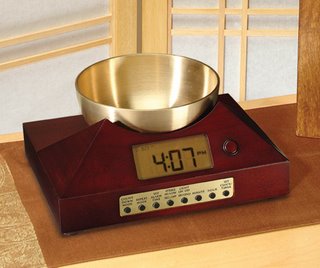 Zen Timepiece with brass singing bowl, a meditation timer
Now & Zen – Chime Alarm Clocks and Meditation Timers
1638 Pearl Street
Boulder, CO 80302
(800) 779-6383
Posted in Bamboo Chime Clocks, Meditation Timers, Meditation Tools, mindfulness practice, Now & Zen Alarm Clocks, Well-being, Zen Timers
 Meditation Some people find the quiet rhythms of meditation just plain annoying. When they try to empty their minds, all they can do is think about the Visa bill that’s due, the kids’ next soccer game, the sneaking suspicion that they’re about to be broken up with. For folks like these, there’s another option. It’s called mindfulness meditation, also known as Vipassana, and according to researchers at the HealthEmotions Research Institute at the University of Wisconsin, it may bring just as many health benefits as more mainstream meditation. In Vipassana, you don’t exactly embrace your anxious thoughts, but you don’t have to push them out the door and move the dresser in front of it, either. Instead, you observe and appreciate the distracting thoughts for what they are: part of life, part of the moment. By not resisting, you can quiet your mental chatter for a time, gain some perspective, and continue to move toward a more relaxed state.
To test the effect of mindfulness meditation on overall health, the researchers assembled 25 members of a study group that was trained in the ancient practice by researcher Jon Kabat-Zinn, who tailored it as a remedy for stress back in the 1970s. Before starting to meditate, each person was given a flu shot to stimulate the immune system; that way re-searchers could compare their bodily responses pre- and post-meditation. Sixteen people who didn’t meditate were given flu shots and included for comparison. The change was dramatic: The study group developed a significantly larger army of flu antibodies than did the nonmeditators. Also, tests showed increased electrical activity in their frontal lobes, the part of the brain associated with happiness and other positive emotions. Next, the researchers plan to study a group that’s been meditating mindfully for 30 years. In the meantime, don’t let unwelcome thoughts keep you from giving this technique a try.
Although meditation can be done in almost any context, practitioners usually employ a quiet, tranquil space, a meditation cushion or bench, and some kind of timing device to time the meditation session. Ideally, the more these accoutrements can be integrated the better. Thus, it is conducive to a satisfying meditation practice to have a timer or clock that is tranquil and beautiful. Using a kitchen timer or beeper watch is less than ideal. And it was with these considerations in mind that we designed our digital Zen Alarm Clock and practice timer. This unique “Zen Clock” features a long-resonating acoustic chime that brings the meditation session to a gradual close, preserving the environment of stillness while also acting as an effective time signal.
adapted from Natural Solutions, May, 2003
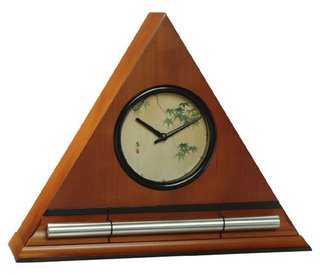 Meditation Timers with Chimes from Now & Zen Now & Zen’s Chime Timer for Meditation Store
1638 Pearl Street
Boulder, CO 80302
(800) 779-6383
Posted in Chime Alarm Clocks, Meditation Timers, Meditation Tools, mindfulness practice, Now & Zen Alarm Clocks, Well-being
 meditation reduces stress Dhyana heyah tad vrttayah.
Meditation removes disturbances of the mind. (Yoga Sutra II.11)
Research also shows that meditation can help people with anxiety disorders. Philippe Goldin, director of the Clinically Applied Affective Neuroscience project in the Department of Psychology at Stanford University, uses mindfulness meditation in his studies. The general practice is to become aware of the present moment—by paying attention to sounds, your breath, sensations in your body, or thoughts or feelings—and to observe without judgment and without trying to change what you notice.
Like most of us, the participants in Goldin’s studies suffer from all sorts of disturbances of the mind—worries, self-doubt, stress, and even panic. But people with anxiety disorders feel unable to escape from such thoughts and emotions, and find their lives overtaken by them. Goldin’s research shows that mindfulness meditation offers freedom for people with anxiety, in part by changing the way the brain responds to negative thoughts.
In his studies, participants take an eight-week mindfulness-based course in stress reduction. They meet once weekly for a class and practice on their own for up to an hour a day. The training includes mindfulness meditation, walking meditation, gentle yoga, and relaxation with body awareness as well as discussions about mindfulness in everyday life.
Before and after the intervention, participants have their brains scanned inside an fMRI (or functional MRI) machine, which looks at brain activity rather than the structure of the brain, while completing what Goldin calls “self-referential processing”—that is, thinking about themselves. An fMRI scanner tracks which brain areas consume more energy during meditation and, therefore, which regions are more active.
Ironically, the brain-scanning sessions could provoke anxiety even in the calmest of people. Participants must lie immobilized on their back with their head held in the brain scanner. They rest their teeth on dental wax to prevent any head movement or talking. They are then asked to reflect on different statements about themselves that appear on a screen in front of their face. Some of the statements are positive, but many of them are not, such as “I’m not OK the way I am,” or “Something’s wrong with me.” These are exactly the kinds of thoughts that plague people with anxiety.
The brain scans in Goldin’s studies show a surprising pattern. After the mindfulness intervention, participants have greater activity in a brain network associated with processing information when they reflect on negative self-statements. In other words, they pay more attention to the negative statements than they did before the intervention. And yet, they also show decreased activation in the amygdala—a region associated with stress and anxiety. Most important, the participants suffered less. “They reported less anxiety and worrying,” Goldin says. “They put themselves down less, and their self-esteem improved.”
 reduce stress with meditation Goldin’s interpretation of the findings is that mindfulness meditation teaches people with anxiety how to handle distressing thoughts and emotions without being overpowered by them. Most people either push away unpleasant thoughts or obsess over them—both of which give anxiety more power. “The goal of meditation is not to get rid of thoughts or emotions. The goal is to become more aware of your thoughts and emotions and learn how to move through them without getting stuck.” The brain scans suggest that the anxiety sufferers were learning to witness negative thoughts without going into a full-blown anxiety response. Research from other laboratories is confirming that mindfulness meditation can lead to lasting positive changes in the brain. For example, a recent study by Massachusetts General -Hospital and Harvard University put 26 highly stressed adults through an eight-week mindfulness-based course in stress reduction that followed the same basic format as Goldin’s study. Brain scans were taken before and after the intervention, along with participants’ own reports of stress. The participants who reported decreased stress also showed decreases in gray -matter density in the amygdala. Previous research had revealed that trauma and chronic stress can enlarge the amygdala and make it more reactive and more connected to other areas of the brain, leading to greater stress and anxiety. This study is one of the first documented cases showing change ocurring in the opposite direction—with the brain instead becoming less reactive and more resilient.
Together, these studies provide exciting evidence that small doses of mental training, such as an eight-week mindfulness course, can create important changes in one’s mental well-being.
adapted from Yoga Journal, by Kelly McGonigal
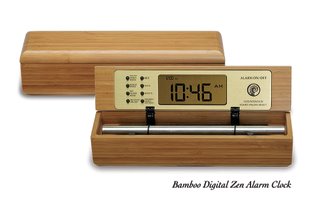 Bamboo Digital Zen Alarm Clock by Now & Zen Now & Zen’s Meditation Timer Store
1638 Pearl Street
Boulder, CO 80302
(800) 779-6383
Posted in Bamboo Chime Clocks, intention, Meditation Timers, Meditation Tools, mindfulness practice, Now & Zen Alarm Clocks, Well-being, Zen Timers
 lovingkindness meditation Put it into practice.
Sit comfortably in a place where you won’t be disturbed. Take three to five quiet breaths. Gently close your eyes.
Imagine the horizon spanning through your chest with a radiant sun rising in your innermost center—your heart. As though being melted by the solar warmth, release tension in your shoulders and across your throat. Soften your forehead and rest your attention inward on the light deep within. Take 7 to 10 smooth, even breaths.
As you inhale, invite the glow from your heart to expand toward the inner surface of the body. With each exhale, let the light recede. Take another 7 to 10 peaceful breaths. Inhaling, invite the light to touch the parts of you that interact with the world—your eyes and ears, the voice center in your throat, the palms
of your hands, the soles of your feet. Exhaling, feel your light shine more clearly. As you continue to inhale and exhale, silently say: “I radiate friendliness for those who are happy, com-passion for those who are unhappy, equanimity toward all.” Continue until your attention wavers. Then, sit quietly for several minutes.
When you feel complete, place your palms together in front of your heart and bow your head. Release the backs of your hands to your thighs and lift your head. Gently open your eyes to return to the horizon of the world.
adapted from Yoga Journal, byKelly McGonigal
Use our unique “Zen Clock” which functions as a Yoga Timer. It features a long-resonating acoustic chime that brings your meditation or yoga session to a gradual close, preserving the environment of stillness while also acting as an effective time signal. Our Yoga Timer & Clock can be programmed to chime at the end of the meditation or yoga session or periodically throughout the session as a kind of sonic yantra. The beauty and functionality of the Zen Clock/Timer makes it a meditation tool that can actually help you “make time” for meditation in your life. Bring yourself back to balance.
 bamboo meditation timer Now & Zen – The Portable Meditation Timer Store
1638 Pearl Street
Boulder, CO 80302
(800) 779-6383
Posted in Bamboo Chime Clocks, intention, Meditation Timers, Meditation Tools, mindfulness practice, Now & Zen Alarm Clocks, Well-being, Zen Timepiece by Now & Zen, Zen Timers
 Peonies at Hyakken, #18 from the series 'Tōkyō Meisho Sanjurokkasen, Utagawa Shigenobu (1826 - 1869)
The bee emerging
from deep within the peony
departs reluctantly.
-Basho-
 maple meditation timer and chime alarm clock called The Zen Alarm Clock, digital style in maple
Now & Zen’s Chime
Alarm Clock &
Meditation Timer Store
1638 Pearl St.
Boulder, CO 80302
Posted in Bamboo Chime Clocks, Japanese Inspired Zen Clocks, Japanese Poetry, Meditation Timers, Meditation Tools, mindfulness practice, Natural Awakening, Now & Zen Alarm Clocks, Progressive Awakening, Ukiyo-e, Well-being, Zen Timers
« Previous Page — « Previous Entries
Next Entries » — Next Page »
|
|
|
|